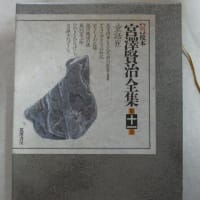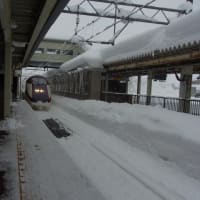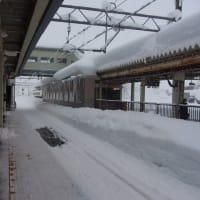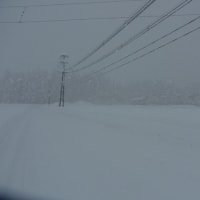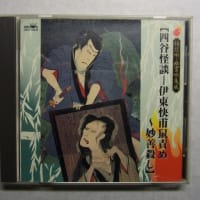今日(2019年11月21日)の『ジャパン・タイムズ』の別刷、「日光特集」には驚かされた。
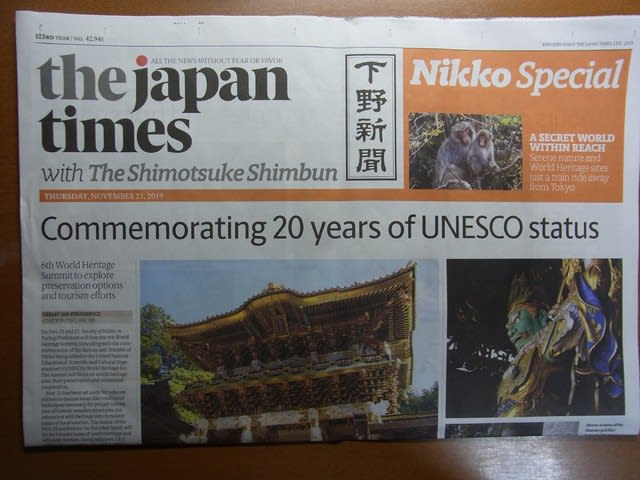
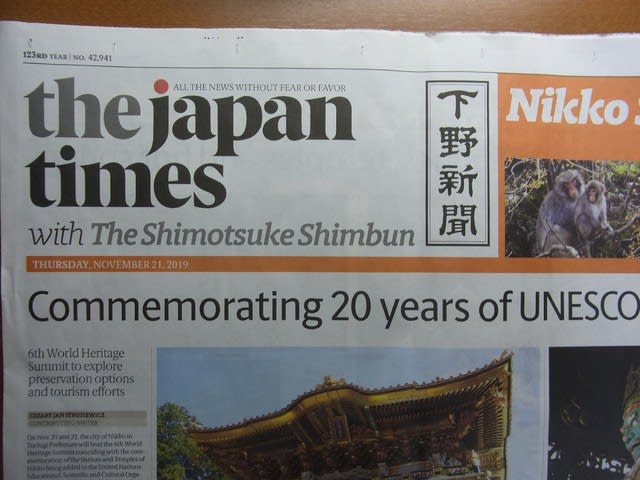
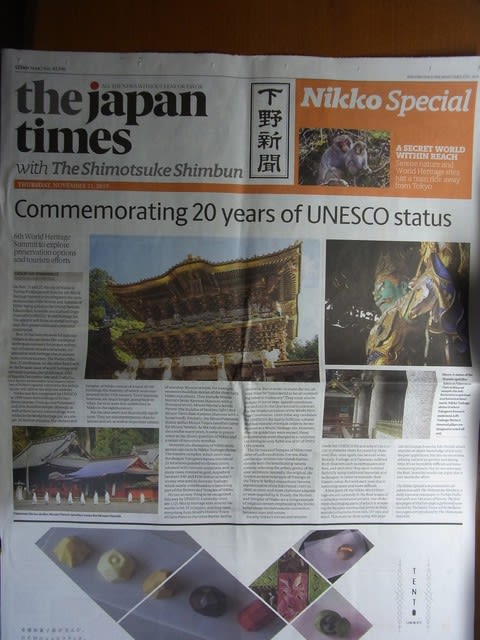
https://www.shimotsuke.co.jp/list/select/20th-nikko
これはコラージュではない(笑)。あの地方紙の星、「下野新聞」の題字が「ジャパン・タイムズ」に印刷されているのである。かつて田中正造や桐生悠々が筆を振るった下野新聞は、この夏私が日光へ旅行したときにもコンビニエンス・ストアで普通に売られていて、それは全国紙以上に好まれている様子であった。
「ジャパン・タイムズ」は最近、英語の勉強の為にと読み始めたのであるが、それぞれの記事が外国の読者を想定しているのでその視点がとても面白く、現代日本を再発見できるような楽しみがある。ただ論説等はやや政府見解寄りかな、とも思う。たとえば、最近「英語」で話題になった「大学入学共通テストへの英語民間検定試験の導入の見送り」の社説がある。ウェブ上では「下野新聞」のそれがなかったので、代わりに「東京新聞」の社説を引用する。
“大学入学共通テストへの英語民間検定試験の導入が一日、見送られた。受験に必要なID(識別番号)の申し込みの初日。まさにぎりぎりの決断だ。混乱を招いた国の責任は重い。
四年制大学の七割が、出願資格や加点などの形で民間試験の利用を予定していた。それが見直されることになる。受験生の不安に最大限配慮し、なるべく早く、かつ分かりやすい周知が必要だ。
「会場確保を(試験を実施する)各団体任せにしていたのも反省している」。延期を明らかにした会見で、萩生田光一文部科学相はそう話した。収益を度外視できない民間団体に任せれば、会場は人が集めやすい都市部が中心となる。どこにどれだけ集まるか分からないから、会場や日時の詳細の公表も遅れる。分かりきった話だ。
今回、萩生田文科相の「身の丈」発言に対する世論の反発の高まりが方針転換を促すことになった。なぜそれまでに立ち止まることができなかったのか。まずは厳しい検証が必要だ。そうしなければ同じ過ちを繰り返す。
民間試験導入は、安倍晋三首相が設置した政府の教育再生実行会議が二〇一三年に提言した。グローバル化への対応を迫られる産業界からの要請で始まった「教育改革」だ。
翌年、教育関係者などを集めて開かれた文科省の協議会の議事録を見ると、現在問題となっている点はすでに指摘されている。大学関係者は高額の受験料と地域格差を懸念し、大学入試センターの関係者は、複数の試験を同列に並べて点数化する困難さを挙げた。
懸念が解消されない中、昨年、東京大学は、民間試験を出願資格とするものの、それ以外の手段で英語力を証明できる余地を残すことを明らかにした。今年に入り民間検定試験「TOEIC」は参加を取り下げ、全国高等学校長協会は延期と見直しを求める要望書を文科省に提出した。
「黄信号」「赤信号」と受け止めるべきサインを過小評価した背景には、一度決めたことは後戻りできないという官僚体質が透けて見える。民間試験導入を推進した文科相経験者など「身内」への配慮が優先し、思考停止に陥っていた側面がなかったか。
今後、二四年度の新制度導入に向け、抜本的な見直しに入る。受験生が十分に能力を発揮できる環境が第一だ。今度は、耳を傾ける対象を間違えてはいけない。”
『2019.11.2. 東京新聞 「英語民間試験 混乱招いた責任は重い」』
https://www.tokyo-np.co.jp/article/column/editorial/CK2019110202000180.html
これに対して、「ジャパン・タイムズ」の見解はこうである。
“The government last week announced it was putting off the planned introduction of private-sector English proficiency tests as part of standardized university entrance exams next April after the new system was criticized for many problems regarding access to testing locations and higher examination fees.
The current English-language component of the standardized entrance exams only assesses reading and listening comprehension. By using private-sector tests that also check writing and speaking ability, there were great expectations that students would be evaluated in a more comprehensive manner and thereby would prepare better to communicate in English.
The announcement was welcomed by many education experts who felt this was the best way to avoid confusion involving the new tests. The ministry will review the system for more than a year while aiming to introduce a new system for around the 2024 school year. However, this will mean the shift to the new test system will be postponed until 2024, and hence the reform of English education will also be delayed. Since Japan already lags behind other countries in terms of English speaking and writing skills, it can’t waste any time in implementing English education reform.
Various problems with introducing the private-sector exams have been pointed out for a long time, but the education ministry was slow to respond to such concerns. When education minister Koichi Hagiuda made a gaffe over the fairness of such tests, saying students should compete for university spots “in accordance with their (financial) standing,” it sparked even more criticism and calls for a postponement increased.
Some media reports pointed out that the government made a swift decision about the delay because it wanted to avert any negative impact on Prime Minister Shinzo Abe’s new Cabinet. But the decision is undoubtedly a severe blow to the students who have been preparing for the private-sector exams, as well as the private-sector test operators. The government should be held responsible for this mess.
Under the proposed system, six private-sector institutions were to provide seven kinds of tests, including the GTEC (Global Test of English Communication), TOEFL, Cambridge English test and Japan’s Eiken test starting next April.
Students would have been able to take the tests twice between April and December during their final year of high school, and universities would have required certain scores to apply for admission or added points based on the results to their independent entrance exams. But some critics said the new system would discriminate against students in remote areas because not all of the proficiency tests would be offered in every prefecture. The fees for taking the exams also varied, with some costing over ¥20,000. This meant students from wealthy families and those living in big cities will have had an advantage.
If the government had stepped in to provide financial support or help private-test operators find test venues in different regions, it might have been possible to reduce these disparities. Before completely giving up on the new system, it should have considered whether it was really impossible to address these problems.
The government must make every effort to ease the anxiety of high school students caused by the change in plans. At the same time, it has to move faster to reform Japan’s English education system to enable students to acquire more practical communication skills.
In recent years, China, South Korea and many other non-English speaking countries have been pushing hard to enhance their English education, and as a result their skills appear to have improved dramatically.
English proficiency rankings illustrate this trend. A 2019 study by EF Education First, a Switzerland-based company that offers language training, ranked the Netherlands at the top of 100 countries surveyed. Looking at Asian countries, Japan came in at a lowly 53rd, far behind South Korea at 37th and China at 40th.
China started strengthening its English education programs in 2001 when Beijing was selected to host the 2008 Olympics. That year, China started to introduce English education four times a week for third-graders nationwide. South Korea began teaching English twice a week starting with the third grade in 1997. In Japan, English classes were introduced in 2011 for fifth and sixth graders, but just for once a week. The education ministry has decided to teach English to third graders in 2020 — almost 20 years behind South Korea and China.
This week, the Liberal Democratic Party’s panel on education passed a resolution urging the ministry to craft a comprehensive English exam that can test four key skills — reading, writing, listening and speaking. The resolution also calls on the government to address the problems surrounding the private-sector exams and construct a framework where these four skills can be evaluated.
It will take five years before the new English tests will begin in 2024, but the government must not freeze Japan’s English education reform for five years.”
『2019.11.9. ジャパン・タイムズ ‘Don't freeze English education reform’』
https://www.japantimes.co.jp/opinion/2019/11/08/editorials/dont-freeze-english-education-reform/#.XdaPu9L7Tct
「東京新聞」が指摘した問題点を認めつつも、たとえば試験会場等で「地域格差」があるのならば、政府が財政のサポートを供給して試験会場を作ってでも民間試験を導入すべきだ、という意表を突く提言をしている。その理由は日本の英語教育には問題があるからだという。ある英語能力ランキングでは日本は53位と、韓国の37位、中国の40位に比べても低い。日本では小学5年と6年生に週1回の英語の授業に対し、中国では小3から週4回、韓国でも同じく小3年から週2回と、大きく遅れをとっている。確かに日本の英語教育が現状のままで良いと思っている人は殆どいないだろうし、この点はその通りであろう。しかし民間試験を導入しさえすればこの問題が改善するだろうというのは論理の飛躍だし、毎年50万人に上る「新市場」への利権も見え隠れする。さりとて、「ジャパン・タイムズ」の主張も分かる。こうなったら一見迂遠なようであるが、国会や新聞紙上で、「理想の教育」を大論争するのが一番良いのではないだろうか。国会はもちろん、「時間無制限一本勝負」である(笑)。
つい「日光特集」の話題から外れてしまった。ここでは、最近ウェブ上で『満喫!とちぎ日和』というとちぎテレビの番組を視聴できることを知って、それがとても楽しいので少しご紹介してみようと思ったのである。
『とちぎインターネット放送局 満喫!とちぎ日和』http://www.pref.tochigi.lg.jp/tib/2ch/tochigihiyori/index.html
① 「とちぎの地酒を満喫!」(2018年1月23日) つぶやきシロー
② 「秋の足利散策を満喫!」(2019年11月12日) 古川登志夫(声優)、柿沼紫乃(声優)
③ 「奥日光 中禅寺湖畔でポタリング」(2018年7月3日) たんぽぽの白鳥久美子
④ 「レイクサイドリゾート奥日光~中禅寺湖~」(2019年8月20日) たんぽぽの川村エミコ
⑤ 「ほっこりかわいい とちぎの伝統工芸品」(2019年6月25日)サトウヒロコ(シンガーソングライター)
⑥ 「とちぎのトマトを満喫!」(2019年2月26日) 涼風花(書道家)
⑦ 「渡良瀬遊水地を満喫!」(2019年11月19日) つぶやきシロー、藤田真奈(とちぎテレビアナウンサー)
つまり言いたいのは、栃木県の文化がどれだけ魅力的なのかということである。

『ススメ!栃木部(4)』一葵さやか

(この写真はコラージュです ^Ⅲ^)
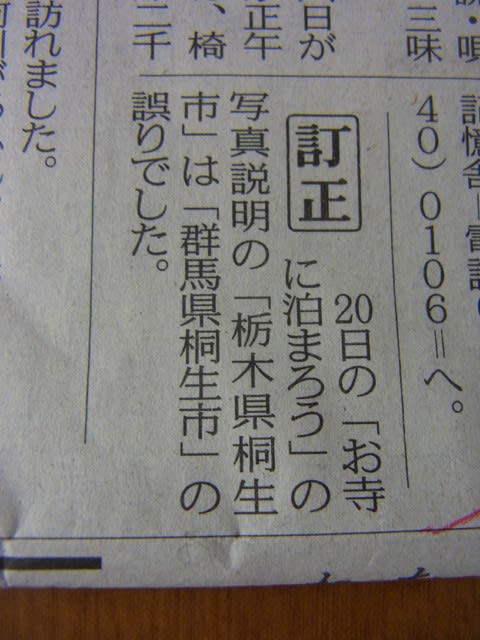
『東京新聞 2019年10月22日』
ごく稀に北関東三県への理解不足からこういった事態も発生するが、また栃木県へいってみたい。




https://www.shimotsuke.co.jp/list/select/20th-nikko
これはコラージュではない(笑)。あの地方紙の星、「下野新聞」の題字が「ジャパン・タイムズ」に印刷されているのである。かつて田中正造や桐生悠々が筆を振るった下野新聞は、この夏私が日光へ旅行したときにもコンビニエンス・ストアで普通に売られていて、それは全国紙以上に好まれている様子であった。
「ジャパン・タイムズ」は最近、英語の勉強の為にと読み始めたのであるが、それぞれの記事が外国の読者を想定しているのでその視点がとても面白く、現代日本を再発見できるような楽しみがある。ただ論説等はやや政府見解寄りかな、とも思う。たとえば、最近「英語」で話題になった「大学入学共通テストへの英語民間検定試験の導入の見送り」の社説がある。ウェブ上では「下野新聞」のそれがなかったので、代わりに「東京新聞」の社説を引用する。
“大学入学共通テストへの英語民間検定試験の導入が一日、見送られた。受験に必要なID(識別番号)の申し込みの初日。まさにぎりぎりの決断だ。混乱を招いた国の責任は重い。
四年制大学の七割が、出願資格や加点などの形で民間試験の利用を予定していた。それが見直されることになる。受験生の不安に最大限配慮し、なるべく早く、かつ分かりやすい周知が必要だ。
「会場確保を(試験を実施する)各団体任せにしていたのも反省している」。延期を明らかにした会見で、萩生田光一文部科学相はそう話した。収益を度外視できない民間団体に任せれば、会場は人が集めやすい都市部が中心となる。どこにどれだけ集まるか分からないから、会場や日時の詳細の公表も遅れる。分かりきった話だ。
今回、萩生田文科相の「身の丈」発言に対する世論の反発の高まりが方針転換を促すことになった。なぜそれまでに立ち止まることができなかったのか。まずは厳しい検証が必要だ。そうしなければ同じ過ちを繰り返す。
民間試験導入は、安倍晋三首相が設置した政府の教育再生実行会議が二〇一三年に提言した。グローバル化への対応を迫られる産業界からの要請で始まった「教育改革」だ。
翌年、教育関係者などを集めて開かれた文科省の協議会の議事録を見ると、現在問題となっている点はすでに指摘されている。大学関係者は高額の受験料と地域格差を懸念し、大学入試センターの関係者は、複数の試験を同列に並べて点数化する困難さを挙げた。
懸念が解消されない中、昨年、東京大学は、民間試験を出願資格とするものの、それ以外の手段で英語力を証明できる余地を残すことを明らかにした。今年に入り民間検定試験「TOEIC」は参加を取り下げ、全国高等学校長協会は延期と見直しを求める要望書を文科省に提出した。
「黄信号」「赤信号」と受け止めるべきサインを過小評価した背景には、一度決めたことは後戻りできないという官僚体質が透けて見える。民間試験導入を推進した文科相経験者など「身内」への配慮が優先し、思考停止に陥っていた側面がなかったか。
今後、二四年度の新制度導入に向け、抜本的な見直しに入る。受験生が十分に能力を発揮できる環境が第一だ。今度は、耳を傾ける対象を間違えてはいけない。”
『2019.11.2. 東京新聞 「英語民間試験 混乱招いた責任は重い」』
https://www.tokyo-np.co.jp/article/column/editorial/CK2019110202000180.html
これに対して、「ジャパン・タイムズ」の見解はこうである。
“The government last week announced it was putting off the planned introduction of private-sector English proficiency tests as part of standardized university entrance exams next April after the new system was criticized for many problems regarding access to testing locations and higher examination fees.
The current English-language component of the standardized entrance exams only assesses reading and listening comprehension. By using private-sector tests that also check writing and speaking ability, there were great expectations that students would be evaluated in a more comprehensive manner and thereby would prepare better to communicate in English.
The announcement was welcomed by many education experts who felt this was the best way to avoid confusion involving the new tests. The ministry will review the system for more than a year while aiming to introduce a new system for around the 2024 school year. However, this will mean the shift to the new test system will be postponed until 2024, and hence the reform of English education will also be delayed. Since Japan already lags behind other countries in terms of English speaking and writing skills, it can’t waste any time in implementing English education reform.
Various problems with introducing the private-sector exams have been pointed out for a long time, but the education ministry was slow to respond to such concerns. When education minister Koichi Hagiuda made a gaffe over the fairness of such tests, saying students should compete for university spots “in accordance with their (financial) standing,” it sparked even more criticism and calls for a postponement increased.
Some media reports pointed out that the government made a swift decision about the delay because it wanted to avert any negative impact on Prime Minister Shinzo Abe’s new Cabinet. But the decision is undoubtedly a severe blow to the students who have been preparing for the private-sector exams, as well as the private-sector test operators. The government should be held responsible for this mess.
Under the proposed system, six private-sector institutions were to provide seven kinds of tests, including the GTEC (Global Test of English Communication), TOEFL, Cambridge English test and Japan’s Eiken test starting next April.
Students would have been able to take the tests twice between April and December during their final year of high school, and universities would have required certain scores to apply for admission or added points based on the results to their independent entrance exams. But some critics said the new system would discriminate against students in remote areas because not all of the proficiency tests would be offered in every prefecture. The fees for taking the exams also varied, with some costing over ¥20,000. This meant students from wealthy families and those living in big cities will have had an advantage.
If the government had stepped in to provide financial support or help private-test operators find test venues in different regions, it might have been possible to reduce these disparities. Before completely giving up on the new system, it should have considered whether it was really impossible to address these problems.
The government must make every effort to ease the anxiety of high school students caused by the change in plans. At the same time, it has to move faster to reform Japan’s English education system to enable students to acquire more practical communication skills.
In recent years, China, South Korea and many other non-English speaking countries have been pushing hard to enhance their English education, and as a result their skills appear to have improved dramatically.
English proficiency rankings illustrate this trend. A 2019 study by EF Education First, a Switzerland-based company that offers language training, ranked the Netherlands at the top of 100 countries surveyed. Looking at Asian countries, Japan came in at a lowly 53rd, far behind South Korea at 37th and China at 40th.
China started strengthening its English education programs in 2001 when Beijing was selected to host the 2008 Olympics. That year, China started to introduce English education four times a week for third-graders nationwide. South Korea began teaching English twice a week starting with the third grade in 1997. In Japan, English classes were introduced in 2011 for fifth and sixth graders, but just for once a week. The education ministry has decided to teach English to third graders in 2020 — almost 20 years behind South Korea and China.
This week, the Liberal Democratic Party’s panel on education passed a resolution urging the ministry to craft a comprehensive English exam that can test four key skills — reading, writing, listening and speaking. The resolution also calls on the government to address the problems surrounding the private-sector exams and construct a framework where these four skills can be evaluated.
It will take five years before the new English tests will begin in 2024, but the government must not freeze Japan’s English education reform for five years.”
『2019.11.9. ジャパン・タイムズ ‘Don't freeze English education reform’』
https://www.japantimes.co.jp/opinion/2019/11/08/editorials/dont-freeze-english-education-reform/#.XdaPu9L7Tct
「東京新聞」が指摘した問題点を認めつつも、たとえば試験会場等で「地域格差」があるのならば、政府が財政のサポートを供給して試験会場を作ってでも民間試験を導入すべきだ、という意表を突く提言をしている。その理由は日本の英語教育には問題があるからだという。ある英語能力ランキングでは日本は53位と、韓国の37位、中国の40位に比べても低い。日本では小学5年と6年生に週1回の英語の授業に対し、中国では小3から週4回、韓国でも同じく小3年から週2回と、大きく遅れをとっている。確かに日本の英語教育が現状のままで良いと思っている人は殆どいないだろうし、この点はその通りであろう。しかし民間試験を導入しさえすればこの問題が改善するだろうというのは論理の飛躍だし、毎年50万人に上る「新市場」への利権も見え隠れする。さりとて、「ジャパン・タイムズ」の主張も分かる。こうなったら一見迂遠なようであるが、国会や新聞紙上で、「理想の教育」を大論争するのが一番良いのではないだろうか。国会はもちろん、「時間無制限一本勝負」である(笑)。
つい「日光特集」の話題から外れてしまった。ここでは、最近ウェブ上で『満喫!とちぎ日和』というとちぎテレビの番組を視聴できることを知って、それがとても楽しいので少しご紹介してみようと思ったのである。
『とちぎインターネット放送局 満喫!とちぎ日和』http://www.pref.tochigi.lg.jp/tib/2ch/tochigihiyori/index.html
① 「とちぎの地酒を満喫!」(2018年1月23日) つぶやきシロー
② 「秋の足利散策を満喫!」(2019年11月12日) 古川登志夫(声優)、柿沼紫乃(声優)
③ 「奥日光 中禅寺湖畔でポタリング」(2018年7月3日) たんぽぽの白鳥久美子
④ 「レイクサイドリゾート奥日光~中禅寺湖~」(2019年8月20日) たんぽぽの川村エミコ
⑤ 「ほっこりかわいい とちぎの伝統工芸品」(2019年6月25日)サトウヒロコ(シンガーソングライター)
⑥ 「とちぎのトマトを満喫!」(2019年2月26日) 涼風花(書道家)
⑦ 「渡良瀬遊水地を満喫!」(2019年11月19日) つぶやきシロー、藤田真奈(とちぎテレビアナウンサー)
つまり言いたいのは、栃木県の文化がどれだけ魅力的なのかということである。

『ススメ!栃木部(4)』一葵さやか

(この写真はコラージュです ^Ⅲ^)

『東京新聞 2019年10月22日』
ごく稀に北関東三県への理解不足からこういった事態も発生するが、また栃木県へいってみたい。












